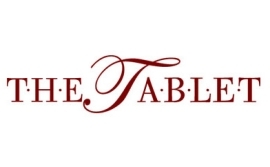- Home
- St. John's In the Media
- Associate Professor the Rev. Patrick Flanagan, C.M., Ph. D., on the Ethical Use of Artificial Intelligence in the Classroom

https://thetablet.org/catholic-colleges-universities-ai-learning-ethics/
By Bill Miller
JAMAICA — This fall, Father Patrick Flanagan, a professor at St. John’s University, just might revive a classic exam tool — the “blue book” — in response to the proliferation of artificial intelligence.
Father Flanagan said people who attended college in decades past would recall the blue-covered booklet filled with blank but lined pages that students used to write their exam essay answers — with a pen, not a keyboard.
Today’s students, by contrast, can plug into computer programs like ChatGPT, Copilot, or Perplexity to generate essay answers.
Father Flanagan chairs St. John’s Department of Theology and Religious Studies.
He also lectures on moral theology in the marketplace, including “cyber ethics.”
His biggest concern, however, is not a student’s use of AI to cheat, but the potential to rob them of the chance to develop critical thinking skills. Hence, Father Flanagan’s renewed interest in the blue book.
“It’s seemingly the only way to get kids to contemplate an organization of thought, and then pump out a reasonable essay,” Father Flanagan said.
This situation is one of myriad issues faced by colleges and universities — including those affiliated with the Catholic Church — on the ever-expanding landscape of artificial intelligence.
Reactionary Stage
Simply put, AI involves internet-based systems that complete tasks traditionally requiring human intelligence, such as learning and problem-solving, but at breakneck speed.
For example, a chatterbot (commonly called “chatbot”) is a computer program that mimics human communication with voice commands or text chats.
The popular Amazon chatbot, Alexa, receives a question via voice command, like “What is today’s weather forecast?” and answers immediately. Apple’s Siri does likewise.
Like other institutions, Catholic colleges and universities actively promote their programs that teach how to use and create artificial intelligence for various applications, like cybersecurity.
Father Flanagan noted how in the past two years the world has seen a “multiplication of all these different platforms and apps.”
“It seems to be that, at this point, we’re in the reactionary stage,” he said. “But we can be reactors at the same time. We could also be constructors. My whole premise is built on the idea that you have to learn how to deal with technology virtuously.”
Many share that sentiment, including the two most recent popes.
Church Prism
In January, the Vatican issued a note approved by Pope Francis that described how Catholics should view the relationship between artificial and human intelligences.
Titled “Antiqua et nova” (Ancient and new), the note warned about the possibility of AI creating more cost-effective solutions for tasks such as financial accounting, thus eliminating high-paying jobs and relegating “deskilled” people to manual labor.
It also declared a “grave ethical concern” of potential AI-controlled military weapons systems like drones that could operate without human control. The note also reminded that Pope Francis, who died in April, had assailed this military technology as an existential risk “that could threaten the survival of entire regions or even of humanity itself.”
His successor, Pope Leo XIV, recently weighed in on AI, calling it “an exceptional product of human genius,” but still a tool, not to be confused with human intelligence.
In a July 11 message to the Second Annual Rome Conference on Artificial Intelligence, the new pope said the development of AI requires steps to safeguard “the inviolable dignity of each human person and respecting the cultural and spiritual riches and diversity of the world’s peoples.”
Thorniest Issues
To that end, schools also explore how to address AI’s moral and ethical issues through the prism of Church teachings on care for human dignity and God’s creation. For example, the Catholic University of America in Washington recently announced new bachelor’s and master’s degree programs in artificial intelligence.
Specialized tracks will include AI in healthcare, robotics, and ethical AI design.
Locally, Catholic colleges and universities are engaging AI issues in their various academic programs.
In 2022, Fordham University’s Department of Computer Science launched a doctoral program to explore multiple facets of artificial intelligence.
According to a Fordham press release, this program wrestles with “the thorniest issues of the field, including privacy and responsibility in fields such as artificial intelligence, data science, and cybersecurity.”
Some, like SJU, are joining forces with other institutions and private industry to share research and explore the safe and moral use of this rapidly growing technology.
Father Flanagan noted how, last year, the university joined the AI Alliance (founded by IBM and Meta) and the AAC&U Institute on AI, Pedagogy, and the Curriculum.
The Common Good
St. Francis College in Brooklyn has a new master’s degree program — Cybersecurity and Critical Infrastructure Protection — currently under review with the New York State Education Department.
Gale Gibson-Gayle, vice president of academic affairs for graduate education, said the program explores AI methods that address real-world threats with “technical expertise and ethical responsibility.”
She also described SFC’s partnership with Cornell University, offering certificates in AI for healthcare and cybersecurity.
John Edwards, vice president of academic affairs for undergraduates, also said the college is exploring new undergraduate and graduate offerings in AI.
“Our goal is to position SFC as a leader in ethically grounded, forward-looking AI education,” Edwards said.
Tim Cecere, SFC’s president, said these programs are based on the Franciscan principles of “integrity, compassion, and purpose.”
“At St. Francis College, we view technology as a profound gift from God to man,” Cecere said. “It is the extension of human creativity and intellect meant to serve the common good.”
